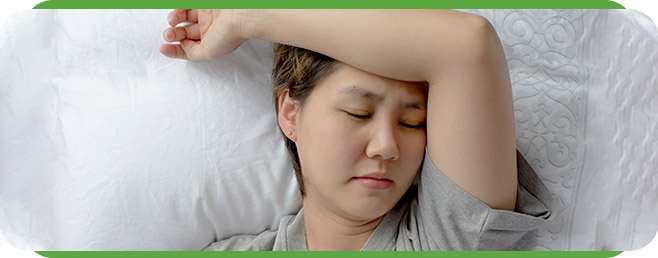Why Am I Having Difficulty Staying Asleep?
Difficulty staying asleep can be caused by stress, anxiety, sleep apnea, or TMJ which can lead to nighttime discomfort or teeth grinding. Other factors like irregular sleep patterns or environmental disruptions may also contribute. An expert at the Koala Center For Sleep & TMJ Disorders can help identify the cause and offer effective solutions. For more information, please contact us today or request an appointment online now! We have convenient locations in Bloomington IL, Peoria/Dunlap IL, El Paso TX, and Wausau WI.


Table of Contents:
Is it common to wake up during the night as I get older?
What causes difficulty staying asleep?
Can sleep apnea cause frequent awakenings during the night?
Should I be concerned if I wake up multiple times each night?
Many medical conditions and sleep disorders become more prevalent with age and can . These include sleep apnea, restless leg syndrome, gastrointestinal reflux disease, and, for men, an enlarged prostate. Conditions like arthritis or chronic pain can also interfere with sleep continuity due to discomfort.
Medications commonly used by older adults can affect sleep. Treatments for high blood pressure, asthma, or chronic obstructive pulmonary disease, for instance, can lead to disturbances in sleep.
Lifestyle factors and age-related cognitive changes also play a significant role in nocturnal awakenings. Consuming alcohol or
caffeine close to bedtime or having a sleep environment that is not conducive to good sleep can lead to more awakenings. We also understand that alterations in memory and cognitive function, as well as anxiety and depression, which are more common in older adults, can affect the ability to fall back asleep after waking up.
Physiological conditions can significantly impact sleep quality, with medical and physical health issues such as sleep apnea, restless legs syndrome, and TMJ disorders being common culprits. TMJ disorders can cause chronic pain, which in turn can disrupt sleep. Certain medications and substances, such as alcohol or caffeine, can also interfere with your ability to stay asleep.
Psychological factors, including mental health disorders and stress, can lead to sleep disturbances. We believe in a comprehensive approach that considers all aspects of your health, including your mental well-being.
Environmental factors, such as noisy or bright sleeping environments and uncomfortable bedding, can also disrupt sleep. We offer
advice on optimizing your sleeping environment for better rest.
Unhealthy lifestyle habits can further contribute to sleep maintenance issues. Our team can provide guidance on establishing regular sleep-wake cycles, managing late-afternoon naps and overexertion before bed, and avoiding stimulating activities before sleep.
Age and genetic predisposition can also play a role in sleep disorders. Our experts are experienced in diagnosing and treating a wide range of sleep disorders, including sleep apnea, narcolepsy, and restless legs syndrome, among others.
Absolutely, sleep apnea can indeed lead to frequent awakenings during the night. This condition is characterized by episodes of apnea, or pauses in breathing, which disrupt the normal sleep cycle and lead to arousals. At Koala Center For Sleep & TMJ Disorders, our experts are well-versed in the causes, symptoms, and treatments of sleep apnea.
During sleep apnea, your airways become blocked or collapse repeatedly, causing you to temporarily stop breathing. This happens due to:
● Oxygen deprivation: Lack of oxygen triggers your brain to wake you up, allowing you to reopen your airways and breathe again.
● Carbon dioxide accumulation: As the body attempts to breathe during an apnea episode, carbon dioxide levels in the blood increase, also triggering arousals.
● Arousal threshold: People with sleep apnea have an increased arousal threshold, meaning they are more likely to wake up from small events or changes in the environment.
Though you may not fully awaken or remember these interruptions in the morning, they can occur hundreds of times a night for those with severe sleep apnea. This can result in fragmented sleep and have several negative consequences:
● Daytime sleepiness: The disrupted sleep pattern leaves you feeling tired during the day, even if you’ve spent enough time in bed.
● Cognitive impairment: Sleep deprivation associated with frequent awakenings can impair cognitive function, including memory, attention, and problem-solving.
● Increased risk of accidents: Daytime sleepiness can increase the risk of accidents while driving or operating machinery.
● Cardiovascular problems: Sleep apnea is a risk factor for cardiovascular problems, such as high blood pressure, heart
attack, and stroke. Frequent awakenings due to sleep apnea may further increase this risk.
At Koala Center For Sleep & TMJ Disorders, we often encounter patients who wake up several times during the night. Not only is this a common experience, but it can also be a cause for concern. Regular nocturnal awakenings could be an indicator of a sleep disorder such as insomnia or sleep apnea, or a sign of an underlying health issue. Frequent nighttime awakenings can impact both your physical and mental health, as your body and brain require a good amount of uninterrupted sleep to function optimally.
If you’re regularly waking up multiple times a night, you might experience symptoms during the day such as fatigue, difficulty concentrating, mood changes, or a decrease in performance at work or school. These are signs that your body is not getting enough restorative sleep. It’s important to seek medical attention at a specialized center like Koala Center For Sleep & TMJ Disorders if you experience:
● Excessive sleepiness or fatigue during the day
● Difficulty returning to sleep after waking up
● Frequent awakenings for unexplained reasons
● Increased urination or urgency at night
● Snoring or gasping for air during sleep
Getting a good night’s sleep is not a luxury, but a necessity for good health. At Koala Center For Sleep & TMJ Disorders, we believe you should not ignore persistent sleep disturbances. Remember, persistent or frequent nocturnal awakenings can significantly impact your overall health and well-being. Seeking medical evaluation and addressing the underlying causes is crucial for restoring restful sleep and improving your quality of life.

Additional Services You May Need
▸ KoalaKIDZzz®
▸ Sleep Apnea
▸ Snoring
▸ TMJ Disorder
▸ Fatigue
▸ Sleep Disorders
▸ Weight Loss
▸ CPAP Alternative
▸ Oral Appliances




